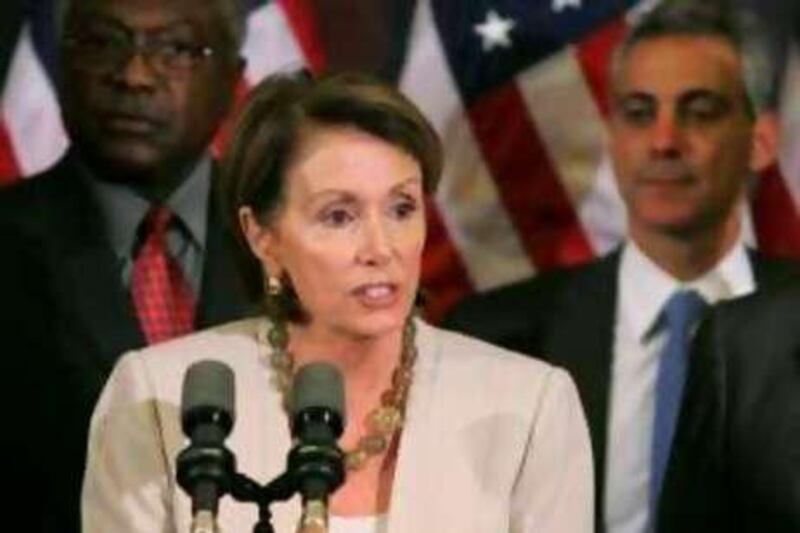WASHINGTON // The bailout package had just gone down to a stunning defeat in the US House of Representatives, the stock market was on its way to a 777-point drop and fears deepened that an already grim financial crisis would only worsen. And this is what was happening in Washington: everyone was blaming everyone else. The House speaker, Nancy Pelosi, blamed House Republicans for the package's defeat, saying the Democratic caucus had "more than lived up to its side of the bargain".
House Republicans blamed - at least initially - Mrs Pelosi for delivering a partisan speech on the House floor before the vote that they said soured some rank-and-file members and cost the deal critical support. A similar scene was playing out on the campaign trail. John McCain, whose popular support has slipped during the economic turmoil, faulted congressional Democrats and his opponent, Barack Obama, for infusing "unnecessary partisanship into the process".
The economic stakes of the current crisis could hardly be higher, as US stocks lost US$1 trillion (Dh3.67 trillion) in value on Monday alone and world markets plunged. But with election day just five weeks away, the political stakes are high, too. If nothing else, the defeat of the bailout package - and the finger pointing that followed - highlight the reality that even the most critical debates over policy are deeply infused with politics, especially in the heat of an election campaign.
Perhaps ironically, defeat of the package - which is deeply unpopular on the very Main Street it is designed to help - was as bipartisan as had been its crafting. Among Republicans, 133 members of Congress, or about three-quarters, voted against it, while on the Democratic side, 95 Democrats, or about 40 per cent, did not support it. Some viewed it as a massive government intervention that abandoned the principle of free markets and smacked of socialism, others sensed a kind of welfare programme for greedy bankers who had made bad decisions on Wall Street.
Ted Poe, a Texas Republican congressman, objected to the bailout in a floor speech last week by noting that the $700 billion price tag meant $2,000 for "every man, woman, child and illegal" in the country. Struggling "mom-and-pop" stores do not get bailed out when they are in financial trouble, he said. "When they make bad financial decisions, they go out of business. But the rich and famous Wall Street New York City fat cats expect Joe Six Pack to buck it up and pay for all this nonsense."
He insisted the government had "no authority to force Americans to ante up a $700bn ransom to save the hides of the rich robber barons on Wall Street". Yet there was more than just ideology driving some of the objections. The slew of "no" votes also reflected concerns House legislators have about their own political futures - all 435 are up for re-election in November - at a time when the public has made clear its distaste for the bailout. Of the 20 Republicans whose re-election races are rated highly competitive by the website CQ Politics, 17 voted against the bill; of the 21 Democrats in similarly tight races, Congressional Quarterly said, 15 voted no.
The bailout's failure immediately became an issue in the presidential race. Mr McCain had staked much on the bailout package, riskily stepping off the campaign trail last week to take part in negotiations in Washington and calling for a postponement of Friday's debate against Mr Obama, which went ahead as scheduled. On the stump on Monday, he was talking up his role in forging a consensus deal almost literally until the package went down to defeat, leaving him scrambling to detach himself from its demise. He said "now is not the time to fix the blame", but then in the same breath fixed the blame squarely on Mr Obama and the Democrats.
Mr Obama's campaign shot back that Mr McCain's comments were "angry and hyperpartisan", and Mr Obama renewed his call for bipartisan action. "One of the messages that I have to Congress is, 'get this done'," the Illinois Democrat said in Colorado shortly after the package's defeat. "Democrats, Republicans, step up to the plate and get this done." Editorial boards of various ideological stripes condemned the House's rejection of the package. The Washington Post said: "The gathering darkness is as much political in nature as economic. Just when it seemed that American democracy had at least temporarily conquered its ugliest habits of partisanship, that the people's elected representatives were about to make a tough decision in the long-term national interest - piqué and polarisation carried the day."
The Wall Street Journal said the "crash and burn" of the bailout plan "reveals a Washington elite that has earned every bit of the disdain that Americans have for it. This crowd can't even make sausage." The defeat of the bailout highlighted something aside from just partisanship: the waning influence of George W Bush, the US president who once had a compliant Republican Congress in his hands but whose pleas to pass the package were roundly ignored.
The president spoke yesterday morning before the opening of the US markets, saying the economy stood at a "critical moment" and that "economic damage will be painful and lasting" if lawmakers failed to pass a bailout plan. "Our economy is depending on decisive action from the government," Mr Bush said. "The sooner we address the problem, the sooner we can get back on the path of growth and job creation. This is what elected leaders owe the American people, and I am confident that we'll deliver."
Mr Bush, the US Treasury secretary, Henry Paulson, and congressional leaders have vowed to continue to work on a financial rescue deal when Congress returns after the Jewish holiday, Rosh Hashanah. The Senate, which was to have voted on the bailout plan today, will not do so. The House will reconvene tomorrow. eniedowski@thenational.ae






